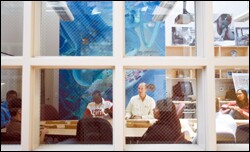High Tech High Learning, a charter-management organization based in San Diego, has become the first recipient of special status from the California board of education that will allow it to open 10 new schools without having to receive approval from local districts.
A 2002 state law gives the state board the authority to grant “statewide benefit charter” status to charter operators with a history of high academic performance. The board authorized High Tech High Learning to open 10 schools in California over five years, with the first two opening in Chula Vista and Escondido in 2007.

“In a sense, it’s like a charter district,” said Larry G. Rosenstock, the chief executive officer of High Tech High Learning.
Since Mr. Rosenstock co-founded the Gary and Jerri-Ann Jacobs High Tech High, the organization’s first charter high school, in 2000, the group has opened one elementary, two middle, and three other high schools. They’re all based on the original school’s model of project-based learning, student internships, demographic diversity, and a college-preparatory curriculum.
Every student in High Tech High’s first two graduating classes enrolled in college, and results on state tests place the school among the highest-achieving high schools in the state, according to the organization. In 2004, High Tech High also won approval from the state to train and certify its own teachers, the only public school in California to have that authority.
Blazing the Trail
The state department of education asked the group to consider being the test applicant for the statewide charter law last year, Mr. Rosenstock said.
After the department’s advisory commission on charter schools unanimously approved the application in May, Mr. Rosenstock and his colleagues appeared before the state board four times before they received statewide status on Jan. 12.
“That is the challenge of being first,” Don Shalvey, the co-founder and CEO of Aspire Public 69��ý, a charter-management organization based in the San Francisco Bay-area community of Redwood City, said about the long process.
The first, perhaps, but probably not the last.
Aspire, which operates 14 schools in the state, also received unanimous approval from the charter advisory commission in December, and will go before the state board in March.
If approved, Aspire plans to open two new schools in the first year, and 10 overall, much like High Tech High, Mr. Shalvey said.
The state board is limiting High Tech High Learning to opening two schools in its first year as a statewide charter and requiring that the new schools show success before others can open.
“I think that’s absolutely critical,” Mr. Shalvey said about the trial period. “I’m glad that the bar is very high.”
Mr. Rosenstock and his colleagues had to agree to other terms, many of which they were already following, he said, in order to get state approval.
For example, the state board requires that 40 percent of the students served at High Tech High Learning’s new campuses come from disadvantaged families. The organization had already committed to enrolling that percentage of disadvantaged students, Mr. Rosenstock said.
Decision Questioned
Stephanie Farland, a senior policy analyst with the California School Boards Association, testified against the group’s statewide status at the Jan. 12 meeting.
“While High Tech High charter is very successful with the students it serves, it doesn’t meet the statewide-benefit-charter requirement,” she said in an interview last week.
The statewide status should be reserved for organizations offering unique programs that local districts cannot provide, she explained.
“The school has been able to accomplish so much …. so why does it need statewide status?” she said.
But having statewide status will allow High Tech High Learning to accomplish even more, Jed Wallace, the organization’s chief operating officer argued.
The organization can now apply for federal-tax credits that encourage building in low-income areas, invest in information technology for its teacher-credentialing program, and provide support to college-bound students by opening schools closer to the colleges they attend, he said.
But, he acknowledged: “High Tech High’s reputation is pretty darn strong … we probably would have been able to open in most of the communities [we’re opening in] anyway.”




